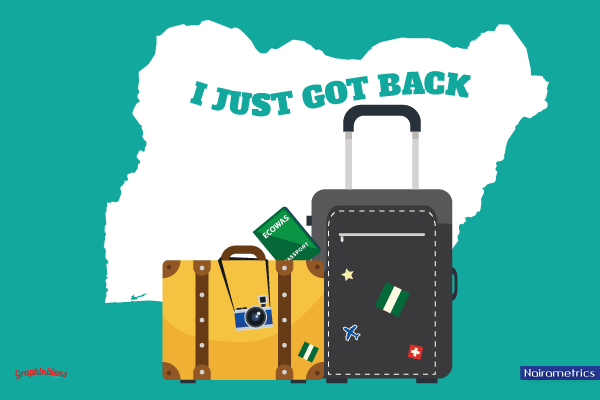The Yuletide season is a time that a lot of Nigerians in diapora choose to return home to visit family and friends.
For some of them that have either not visited the country in a very long time or are making their first visit to Nigeria, we like to call them I just Got Back (IJGB) Nigerians. They should expect to have some difficulty navigating around and getting to do things in Nigeria, because as they may have well guessed by now, Nigeria is a lot different from whatever world they are coming from.
As you attempt to settle down and find your way around, here are a few useful tips you might need.
Unlike in Western Countries where the rent is paid weekly or monthly, rent in Nigeria is paid annually. In addition to your rent, you also pay for agency and legal fees of at least 10% of the annual rent. In some cases, the landlord can mask as both the agent and the lawyer just to rip you off. Bear in mind that in Lagos, the law allows you to pay 6 months in the first instance and monthly afterwards. But no one follows that law so, do not waste your time lamenting. Rather focus on getting a landlord that will allow you pay for one year. If you are lucky to deal with a reasonable landlord, you will not need to pay all those ridiculous fees. Agents by the way, charge you reimbursement of the money they spend on transport looking for a house for you. It is also not deductible from the fees you pay them.
If you want to buy a house, then we strongly suggest you buy from a property developer with a completed unit of housing. Should you decide to build yourself, then make sure you get a lawyer to run a search of the land from the state land registry. Lagos in particular is used to the menace of “omoniles” aka landowners who can sell the same land they sold to you to multiple people. It is who builds first that often wins this battle.
Nigeria still doesn’t have a mega transportation system so don’t expect to see rails or some sophisticated mass transit. In Lagos, we have the Bus Rapid Transit popularly known as BRT, which is quite comfortable but doesn’t cover all routes. To compliment them are medium-size buses, popularly called Danfo, in Lagos which seats about 14 passengers.
We also have motorbikes, popularly called Okada which people rely on to get to their destination faster. But please no matter what you do, never ride okada. The riders are not trained and can barely read road signs. They don’t wait for traffic lights and are prone to accidents. If you must get to your destination on time leave early. We also have tricycles which are popularly called Keke or Maruwa. They are much better than Okadas but can be a nuisance if you have a car. And yes, we have Uber and Taxify, two of the most popular ride-sharing apps.
Okay, that’s great. Make sure you apply for a driver’s license. You can get this from the nearest Road Safety office embedded in a local government area or council office. At first, they will give you a temporary one to use. This is because the permanent ones can take months to be finalised. You can use the temporary ones for at most 6 months. We do not do driving tests here and points are not deducted even when you drive like a mad man. Just don’t harm anyone or you might be lynched.
You will also need to register your vehicle and ensure to do all that is necessary to avoid police wahala (problems). We also have comprehensive vehicle insurance, which insures your car against theft, accidents etc. Insurance premiums are like 4-5% of the value of the car (which is yours to decide). We also have third-party insurance which cost as little as N5k. It doesn’t get you anything it says it does except to comply with statutory requirements. Third-party is a must in Nigeria.
You will need to open a bank account with any of the 11 banks we have in Nigeria. Banks hardly fail these days but we advise you to stick with the one that can offer you the best deal and is more customer-friendly. It can take up to 48 hours to open a bank account and the requirements can be annoying. Make sure you have 4 passport photographs, a utility bill (possibly the light bill of wherever you stay), and an Identity card. If you are opening a current account then you would need a referee, usually someone who has a current account, to sign a reference form for you. Banks also give you a unique Bank Verification Number (BVN) which you will always use regardless of how many banks you have accounts with. Make sure you also fill all the forms for your ATM Card (debit cards), internet banking and bank alerts. Bank alerts are a few message services which allows the bank to send you messages whenever you get a debit or credit on your account.
Nigeria’s financial system is surprisingly well advanced when it comes to fund transfers. You can transfer funds to just about any bank from your mobile phone and it will hit the receiver in seconds. Online banking transfers are also very possible and quite reliable. You might face challenges with payments that don’t get delivered despite your accounts being debited. Sometimes it gets reversed almost immediately and in those rare occasions, it doesn’t. You might need to get used to calling customer care to get issues resolved. We observed banks and indeed service providers from other industries respond faster to complaints on social media.
In case you didn’t know, Nigeria as a health insurance scheme. Not the best in the world but it sure works. To get one, go online and search for any of the registered Health Maintenance Organisations. They are the ones licensed to sell you the insurance. Once you buy from them, they give you access to any of their partner hospitals where you can visit whenever you have health issues. Health insurance cost as little as N40k for basic services. This is important considering that mosquito bites are nearly inevitable.
Getting a job
One of the things you probably hope to achieve by being back is to get a good job in your home country. Jobs are hard to find here no matter where you went to school. You might find it easier to get a job in the financial sector of you have a financial background or a consulting firm. Make sure you have the right certifications as MBAs and MSCs no longer have the advantages they used to have. How you package yourself really matter. Know when to use an accent, especially if it is acquired. Accent probably helps in job interviews if you can match it with the right responses and open display of knowledge in subject matters. The easiest way to get a job is via referrals. Job sites send you loads of job offers but it’s hard to get a good job there. Spend time connecting on LinkedIn to know the people who matter. Before you go for an interview make sure you conduct proper research, not just on the company but on the industry. Also try to relate the industry with an experience from where you are coming from and show it as an advantage. Be very conversant with the Nigerian economy and please don’t be cocky. Sometimes, it is better to start from somewhere, even if it is small. Trust me, you don’t want to be idle in this town.
Nigeria operates a somewhat complicated tax system called Pay as You Earn. Taxes are deducted monthly by your employees and paid to the state inland revenue service.
If your salary is between N12m and N21m per annum expect to pay an average of 15% of that as tax. If you earn above N21m then you should be looking at 16% per annum. Salaries between N5m and N10m per annum range between 12% and 14% per annum.
Nigeria also has a pension scheme that requires 8% of your gross salary to be deducted by your employees and stashed away as pension contributions. Your employer also contributes 10% of the gross amount for you.
In Nigeria, salaries are paid in Naira except you are employed as an expat.
In Nigeria, we have electricity bills, internet data bundles, cable TV bills and waste bills. If you live in fully services estates, you might get all these bills (except cable) as one bill. Some service estates charge between N40k to N120k a month for these services. If you live on your own, then be ready to pay your electricity bills to the power distribution company (discos) within your region. In Lagos, we have Eko and Ikeja distribution companies. Electricity bills can be very annoying if you do not have a meter as you will be estimated and might be subject to what we call “crazy bills”. Discos typically have their employees move around with ladders to disconnect customers who do not pay their bills.
Internet service in Nigeria is mostly sold in bundles. You can pay as much as N10k for 20GB of data. Some services offer unlimited bundles but with a data cap of 80gb before terms and conditions apply. Internet is not as fast as what you have in the US or Europe but is good enough to get you to browse. You can also get internet on your mobile phone and use it as a hotspot for your laptop or tablets.
This is one problem you will have to get used to. From mechanics to painters, to drivers to house helps, unskilled labour is cheap in Nigeria. However, this comes at a significant cost too as their services are quite poor. Be ready to spend time and energy at mechanic workshops and still see your cars come out worse than before. You might change house helps up to 3 times a year depending on your tolerance level. It often takes a lot of luck to get the right artisan or unskilled labour to keep you from running mad. You just must be patient and learn not to expect too.
We are sure you may have learned by now that it is not easy doing business in Nigeria. Your clients can delay your payments for months without any compensation or interest for loss of time. And when they eventually get to pay, rogue employees may ask for kickbacks, otherwise they won’t give you the job again. Suppliers can also be a pain in the butt and often delay you from meeting deliveries on time.
Should you decide to go into partnerships then, be ready to get disappointed and frustrated. Agreements are easily breached and the legal system is not just equipped enough to settle all disputes. Try as much as possible to avoid going into partnerships.
When you lend someone money just assume it is lost. This might seem hard but it’s better to assume the worst can happen to avoid getting a heart-break. The police have a lot on their plate and might advice you to leave the “matter to God”. If they are “kind enough” to help then be ready to be kind enough to support them with some money for “logistics”.
Do you need further assistance? Send us an email [email protected]
Nairametrics is Nigeria’s top business news and financial analysis website. We focus on providing resources that help small businesses and retail investors make better investing decisions. Nairametrics is updated daily by a team of professionals. Post updated as “Nairametrics” are published by our Editorial Board.
Your email address will not be published. Required fields are marked *
Business News | Stock Market | Money Market | Cryptos | Financial Literacy | SME |
Follow us on social media:
© 2022 Nairametrics
© 2022 Nairametrics






